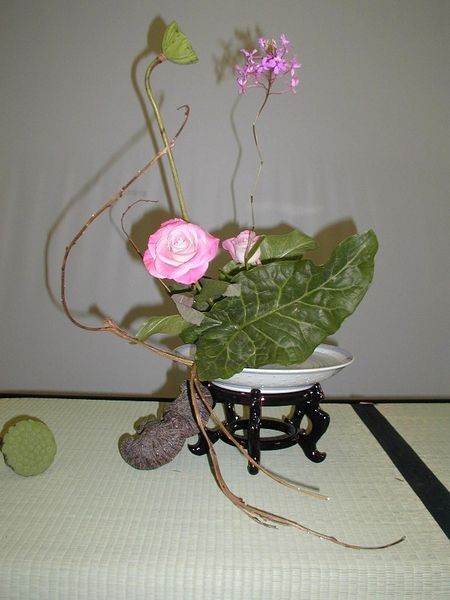LITR 5535: American
Romanticism
 Student Poetry Presentation 2006
Student Poetry Presentation 2006
Monday 18 September:
poetry: Cathy Song, "Heaven," N 2847
poetry reader / discussion leader: Nguyen Le
I. ABOUT THE
AUTHOR AND HER WRITING:
Cathy
Song is a contemporary poet. She was born in Honolulu, Hawaii in 1955 and now
teaches creative writing at a number of colleges and universities. She has had a
number of publications, including Picture Bride (1983), School Figures
(1994), and The Land of Bliss (2001).
In
many of Cathy Song’s poems, a particular moment or event becomes a window
through which she enters a field of vision. “What frames the view,” she has
written, “is the mind in the diamond pinpoint light of concentration tunneling
into memory, released by the imagination.” Song suggests that the artist and
poet capture the moment, knowing that it is always dissolving. Besides, Song’s
tactful sense of both the power and the limits of imagination is one of her
distinctive marks as a poet.
Song’s
ability to write about her own or another’s experience as an acute observer
may have to do with her multicultural background, which often places her on the
boundary of what she sees.
The
careful composition of her poems, with their vivid detail, blend the accidental
and spontaneous quality of life with the design of art, like the Japanese floral
arrangement she describes in her poem “Ikebana”. Although her work can
sometimes seem too composed, too removed from the sharp impact of experience,
her strongest poems balance a sense of tradition with a feel for contemporary
life and catch in the patterns of art the transient instant: “the flicker of a
dragonfly’s delicate wing.”
(Notes from Norton Anthology)

example of ikebana (Japanese art of flower arrangement)
II. THE POEM
“HEAVEN” (N 2847)
HEAVEN
Cathy
Song
He
thinks when we die well go to China
Think
of it – a Chinese heaven
where,
except for his blond hair,
the
part that belongs to his father,
everyone
will look like him.
5
China,
that blue flower on the map,
bluer
than the sea
his
hand must span like a bridge
to
reach it.
An
octave away.
10
I’ve
never seen it.
It’s
as if I can’t sing that far.
But
look–-
on
the map, this black dot.
Here
is where we live,
15
on
the pancake plains
just
east of the Rockies,
on
the other side of the clouds.
A
mile above the sea,
the
air is so thin, you can starve on it.
20
No
bamboo trees
but
the alpine equivalent,
reedy
aspen with light, fluttering leaves.
Did
a boy in Guangzhou dream of this
as
his last stop?
25
I’ve
heard the trains at night
whistling
past our yards,
what
we’ve come to own,
the
broken fences, the whiny dog, the rattletrap cars.
It’s
still the wild west,
30
mean
and grubby,
the
shootouts and fistfights in the back alley.
With
my son the dreamer
and
my daughter, who is too young to walk,
I’ve
sat in this spot
35
and
wondered why here?
Why
in this short life,
this
town, this creek that they call a river?
He
had never planned to stay,
the
boy who helped to build
40
the
railroads for a dollar a day.
He
had always meant to go back.
When
did he finally know
that
each mile of track led him further away,
that
he would die in his sleep,
45
dispossessed,
having
seen Gold Mountain,
the
icy wind tunneling through it,
these
landlocked, makeshift ghost towns?
It
must be in the blood,
50
this
notion of returning.
It
skipped two generations, lay fallow,
the
garden an unmarked grave.
On
a spring sweater day
it's
as if we remember him.
55
I
call to the children.
We
can see the mountains
shimmering
blue above the air.
If
you look really hard
says
my son the dreamer,
60
leaning
out from the laundry’s rigging,
the
work shirts fluttering like sails,
you
can see all the way to heaven.
(1988)
Objective 1a: The Romantic Spirit
* the quest or journey of the
romantic narrative involves crossing physical borders or transgressing social or
psychological boundaries in order to attain or regain some transcendent goal or
dream.
* To identify and criticize ideas
and attitudes associated with Romanticism, such as nostalgia, the sublime.
What are the details that show the prevailing
ideology of romanticism in this poem?
Are there any restraints on the journey to
“heaven”?
Objective 1b: The Romantic Period
To speculate on residual elements
in “post-Romantic” writings from later periods including “Modernism” and
“Postmodernism”.
Cathy Song is a contemporary poet. In what
way has she continued the romantic tradition in the modern time?
Objective 2: The convergence of
“America” and “Romanticism” enables us to investigate to what degree
American popular culture and ideology represent a popular or derivative form of
classic Romanticism.
How does the American setting now give Song
the romantic and nostalgic inspiration?
Further discussion
questions:
1. Is the free-verse format
of the poem anything to do with romantic expression?
2. To what extent does her
multicultural background influence her choice of China and a Chinese boy for her
nostalgic and transcendent inspiration?
3. Are the feminine
traditions of relations and domesticity reflected in this poem?
|
|
|
|

